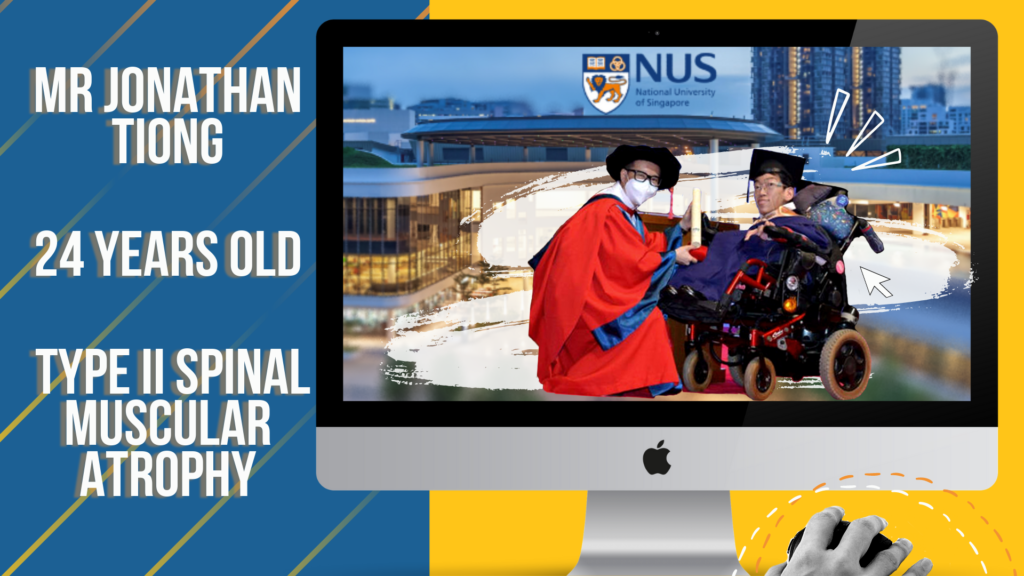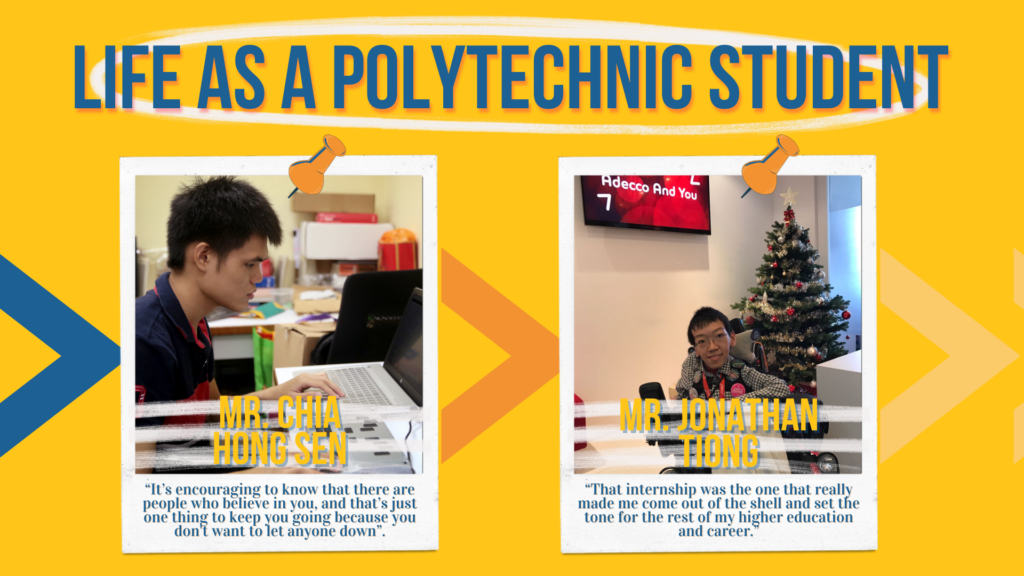Written By Russell Lee & Rebecca Santa Maria
Life as a polytechnic student is never easy – we often struggle with balancing an ever-increasing number of assignments, our social lives and other everyday commitments. Yet, there are students amidst us who persevere past these common challenges, while also dealing with additional struggles and plights on their own.
Mr Jonathan Tiong, 24, is a Temasek Polytechnic (TP) alumnus, graduating in 2017 with a diploma in Psychology studies. Most recently, he graduated from National University Of Singapore (NUS) in October 2021 as the valedictorian of his cohort. He now works as a full-time editorial writer for GIC, a prestigious sovereign wealth fund in Singapore. While these accomplishments are impressive in their own right, Jonathan’s achievements are further proof of his own grit and determination.
As an infant, Jonathan was diagnosed with type two spinal muscular atrophy, an extremely rare genetic disease that causes weakness and the loss of muscle mass. This disease has caused him to be wheelchair-ridden for almost his entire life, with doctors even telling his parents that he would not live past the age of two. Despite these seemingly insurmountable odds stacked against Jonathan, he has overcome all of them to get to where he is today.
Said Jonathan with a smile: “I think that’s a recurring theme in my life … I’m always being caught by surprise about good things that have brought me to where I am today.”

In a webinar, Succeeding In Higher Education With DisAbilities, Joanthan was one of two TP alumni who shared their experiences of how they cleared the plethora of hurdles thrown at them throughout their lives, despite their adherent physical limitations. The webinar, which took place in November 2020, also featured Mr Chia Hong Sen, who was born with retinal dystrophy, a condition that affects his eyesight.
Special Educational Needs support in schools
While there is no definitive answer as to how many disabled Singaporeans there are in total, according to a study done by SG Enable in 2013, which is the only one that has been done in recent years, shows that 3% of Singapore’s population, or close to 100,000 people, have some form of disabilities. Out of this number. 10,000 of them are currently students enrolled in our local educational institutes. (Ministry of Education. 2021)

Over the past few years, support for these students has increased exponentially, with more and more specialised programmes and amenities, like the Special Educational Needs (SEN) support, which is a service dedicated to aiding students with special needs, being implemented into our schools. Nevertheless, the path to the top for these students can be difficult due to the various physical and mental obstacles they encounter throughout their educational journey. These include dealing with the judging eyes of peers around them, as well as also coping with the difficulties in completing their school projects, that their disabilities bring about.
Hong Sen, 25, is currently pursuing a career with Guide Dogs Singapore, working as a trainer and consultant in the IT and Accessibility department. He can only detect light and shadow, due to his condition, and can only distinguish colours to a small extent. Graduating from TP in 2016, he obtained a diploma in Information Technology.
Since then, Hong Sen has gained experience in managing IT training for the visually impaired and in developing software and accessibility design for mobile and online applications. He also received his Bachelors of Science (Honours) in 2019, with Management and Digital Innovation from the University of London, London School of Economics and Political Science in the UK.

For Hong Sen, the transition to the polytechnic system was overwhelming at first. However, he gained motivation from his lecturers’ support and belief in him.
He said: “It’s encouraging to know that there are people who believe in you, and that’s just one thing to keep you going because you don’t want to let anyone down.”
How internships helped them to grow
Another integral aspect of a polytechnic student’s life is their internship, which gives them a taste of what working life is like outside of school. For Jonathan, his internship at a recruitment consulting agency for a European multinational corporation was his most memorable experience during his three years with TP.
Being naturally reserved and shy initially, Jonathan found it intimidating to be surrounded by colleagues who were much older and more confident in their work than he was. Nonetheless, he took this opportunity to step out of his comfort zone and grew his confidence along the way.
“That internship was the one that really made me come out of the shell and set the tone for the rest of my higher education and career,” he shared.

In NUS, Jonathan went through another internship stint, this time with GIC. This eventually led to him being offered a full-time position with the firm. Both internships were arranged by SG Enable, an agency dedicated to enabling individuals with disabilities.
To this day, Jonathan remains thankful to SG Enable for their role in his academic and professional lives.
“Even in the job I am currently doing, I still interact a lot with SG Enable, as my company is ramping up our disability inclusion efforts,” he explained. “We do that in partnership with SG Enable, because who better to advise us on this journey than the experts over there.”
Added Hong Sen, whose internship was also secured by SG Enable: “(My internship) really opened the door for me to look into accessibility differently. It is not just a ‘does it work’ or ‘does it not work’ situation, but rather, ‘how do we get things to work better?’”

After graduating, Hong Sen continued to work with TP, creating new systems to improve accessibility. He also got involved in different social enterprises, carrying out research, proposal writing and helping them to applying for funds. For the past five years, he has volunteered to conduct IT training. He then eventually moved on to his current role where he finds his work “more meaningful”.
As a trainer and consultant in IT and Accessibility for Guide Dogs Singapore, Hong Sen’s role consists of two parts. In IT Training, he teaches those with visual impairment how to navigate everyday devices. For example, how they can use electronics and assistive technology, such as screen readers or magnifiers so that they can see the screen better. Secondly, in the accessibility department, Hong Sen works with external partners to create accessible solutions for the visually impaired.

Towards a more inclusive society
Hong Sen and Jonathan are optimistic that the Singaporean education system is heading in the right direction when it comes to supporting those with disabilities. They shared that during their time in TP, there were little to no programmes curated for students to raise awareness for those with disabilities. Now, there are programmes such as the TP LEAD heart programme and webinars that let students gain a better understanding of how they can better support peers with disabilities.
However, Hong Sen noted that this is just the start of a journey towards a more inclusive society. He said: “Yes we are getting more and more inclusive, but more can still be done. True inclusion is such that others see us as regular people and not as some form of museum exhibit.”

To those struggling with disabilities or other growing pains in life, Jonathan’s advice is to be more forgiving towards themselves and be proud of where they are today.
“Relax and take it slowly, don’t be burnt out on life. Remember to be nice to yourself and relax, enjoy life and take things one step at a time,” he said.
Added Hong Sen: “For others to understand us, we have to understand others. Why are they doing what they are doing, figure out why they react in a certain way and look at things more objectively.”
His final piece of advice is to stay positive and build a strong support system.
“Cherish your friends who do understand you. And never give up on yourself.”




